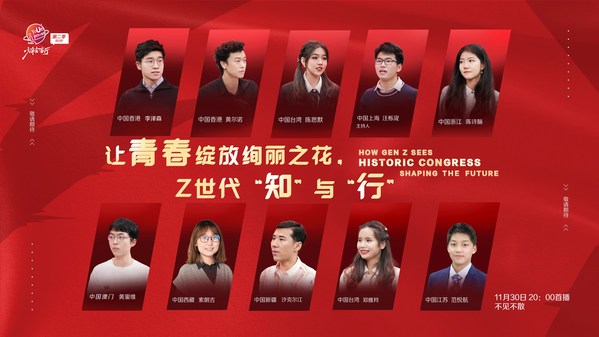BEIJING, Nov. 30, 2022 /PRNewswire/ — The sixth episode of the second season of the China Daily broadcast Youth Power, titled “How Gen Z sees historic congress shaping the future”, aired on Nov 30.
In this episode of Youth Power, Chinese youth were invited to take a journey back in time through time capsules to look at what the spirit of the 20th Communist Party of China National Congress, held in Beijing recently, entails and to consider the journey the Party has traveled since it was founded 101 years ago.
The first time capsule was a street interview from the 1990s in which Gen Zers saw how Chinese people of the day envisioned their country’s future. Twenty to 30 years later many of these visions have become reality and China has embarked on a new path of modernization.
The Chinese Gen Zers who took part in the program said that the success of the Chinese path to modernization offered a new model for other countries to distinguish themselves from the traditional Western way. Li Zesen, a student at Tsinghua University in Beijing who hails from Hong Kong special autonomous region, said the Chinese development path has shown the world that every country can have its own theory and path to modernization.
“Each country can have their own sort of method, their own ways, their own concrete paths towards modernization, and there is not one sort of textbook example. All countries in their own unique context have their own way. What works for us is that we put the people in the first place.”
The next time capsule opened with a “green train” ticket for Spring Festival in 1996. Green trains, a traditional nickname for Chinese old-style passenger trains, are something burnished in the minds of many people. And today, with high-speed rail becoming one of China’s four new great inventions, Gen Zers have witnessed the rapid development of the country’s infrastructure.
Chen Shihua, a student at Peking University, said infrastructure was also the symbol of a country’s modernity. “They’re actually the road that could link hearts and minds. They are giving kids opportunities to seek better education to give youngsters opportunities to seek their dreams, pursuing their personal development and giving people a way to see the outside world. And that is the reason why we build this infrastructure: for the prosperity of the nation.”
Infrastructure development is an important way for China to achieve common prosperity for its people, the Youth Power guests said. Taking the railway between China and Laos as an example, the host Zhong Yutong suggested that under the Belt and Road Initiative, China has helped neighboring countries with their infrastructure development. Huang Yunwei, a student at Shanghai International Studies University, said that “we not only create a bridge that is unobstructed but also a bridge of communication with other countries”.
The topic of China’s reunification also produced lively debate in this episode of Youth Power. Zheng Yaling, a Gen Zer from Taiwan province, a student at Hunan University, opened the time capsule of the book Gaoshan People by Tian Fuda, the only representative of the Gaoshan People at the age of 20 who witnessed the founding ceremony of New China in 1949.
Zheng said a poem in the book reminded her of the Wenchuan, Sichuan, earthquake of 2008, when Zheng, then 8, took her piggy bank to school, and, to her surprise, all her classmates did as well. In fact many Taiwan residents offered help in the aftermath of the quake, in which at least 69,000 people died, she said. They always believed that people on both sides of the Taiwan Straits are family, and that “blood is thicker than water.”
Chen Simo, who is also from Taiwan, talked of her identity, saying: “We can love the hometown that my father comes from and the hometown that my mother comes from. We can just love our Chinese mainland and love our Taiwan province at the same time. And this is not a two-for-one, multiple choice.”
She also expressed her willingness to become a messenger of peace to build a bridge of communication between the two sides of the Taiwan Straits.
The time capsule opened by Shakeerjiang of Xinjiang Uygur autonomous region was a set of tapes with the song Where Are You Going, Uncle Kurban?, a beautiful melody that has passed down from generation to generation among the people of all ethnic groups throughout China.
Suo Langji, a Gen Zer from Tibet, said: “At Renmin University of China I was able to experience the unity and harmony of all nationalities. We have helped each other and encouraged each other and become lifelong friends.”
Suo said that if the young thrive, the nation and its regions will prosper and become stronger. Young Tibetans and youths all over China have the same desire, “to dedicate ourselves to the prosperity of our country”, she said.
After opening the time capsules the Gen Zers expressed their wishes for the future for themselves, as well as for China and for the rest of the world, by making a new time capsule together.
Inspired by the CPC National Congress, the Gen Zers said they would answer the call of their times, live to the full, meet the expectations of the Party and the people, and strive to be brilliant Chinese youth.
Youth Power, organized by China Daily and first broadcast in June last year, aims to build a global platform for communication and exchange focusing on the interests and ideas of Generation Z. The program comes in the form of interviews, forums and speeches, with topics related to anything of current interest in the world.
















